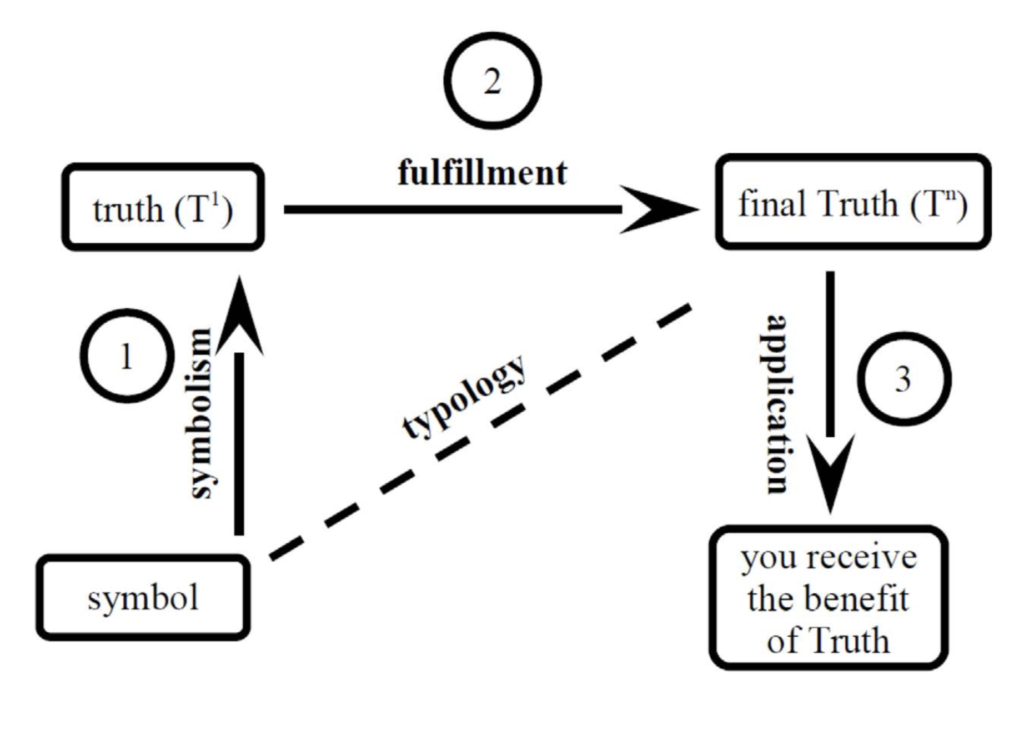Christocentric Preaching
August 06, 2020by Vern Poythress
A Homily Using Edmund Clowney’s Triangle
Let us begin with a short homily on Genesis 15:1-6. This homily illustrates the use of Clowney’s triangle of typology, which represents a two-step process: finding the meaning of a symbol (S) in its own time (truth T1), and then discerning how the truth is fulfilled in Christ (truth Tn).2 Application is best worked out as a third step, after discerning the role of Christ. (See fig. 1.1.)
Fig. 1.1: Edmund Clowney’s Triangle, Summarizing Steps for Typological Reasoning 3
Proclaiming the Word
1 After these things the word of the LORD came to Abram in a vision: “Fear not, Abram, I am your shield; your reward shall be very great.” 2 But Abram said, “O Lord GOD, what will you give me, for I continue childless, and the heir of my house is Eliezer of Damascus?” 3 And Abram said, “Behold, you have given me no offspring, and a member of my household will be my heir.” 4 And behold, the word of the LORD came to him: “This man shall not be your heir; your very own son shall be your heir.” 5 And he brought him outside and said, “Look toward heaven, and number the stars, if you are able to number them.” Then he said to him, “So shall your offspring be.” 6 And he believed the LORD, and he counted it to him as righteousness. (Gen 15:1-6)4
In this life, what grips you? What grabs your attention and energy? Abraham was concerned to have a son who would be his heir. That concern does not necessarily strike us as gripping. So what grips you? What grips me? The desire for happiness? Family? Achievement at work? Increase in knowledge? Many of us know that the right answer should be something like “God himself” or “the glory of God.” But that might not be the same as what actually grips our attention and desire. Whatever good things we may experience in this world are gifts from God. They are tokens and expressions of his blessing. At their best, they express personal communion with God, and we experience the presence of God through them. But in sin we are tempted to seize the gifts apart from the Giver.
Whatever good things we may experience in this world are gifts from God.
Abraham belongs to a culture different from our own, but at a fundamental level his desires are the same. A son who is an heir is a blessing from God. It betokens the fundamental blessing, communion with God: “I will be your God” (see Gen 17:7-8). A line of descent offers a shadowy symbol of ongoing life. The ongoing life represents Abraham’s life blood, extending from generation to generation. It is a shadow of eternal life, in communion with the living God, the God who is the fountain of life. Moreover, in Abraham’s case his offspring is special. God’s promises in Genesis 12:2 and 13:15-16 already suggest that Abraham’s offspring is also the offspring of the woman. Through this line definitive, climactic salvation will come.
How will you have communion with God, the God of all life? How will Abraham? How could God bring it about for you and me? How—when we, like Abraham, are doomed to die because of our sin? It is by God speaking and promising: God says, “Your very own son shall be your heir” (15:4). God who knows the inmost heart knows the question behind Abram’s question. He understands the feeling of impossibility. It is as if he says, “Come outside, Abraham. I want to show you something.”
“Come outside, Christian, I want to show you something.” “Look toward heaven.” In the silence of the night, in the countryside, what do you see? Stars. Many of them. It is magnificent. They testify from age to age about the power and beauty and magnificence of the one whom made them (Ps 19:1-2). Theirs numbers testify to abundance of God’s power, his power to multiply and make fruitful. The stars of heaven link us symbolically to the reality of heaven and the one who dwells there. Each star links us to the beauty and brightness and purity and abundant power of God. The stars thereby represent communion with God. God says to Abraham, I grant you blessing, beyond the bounds of earth. Blessing that signifies the reality of communion with God. The blessing of a son. But not one son only. A multitude. A multitude testifying to the fruitfulness of God, analogous to the multiplication of stars. The blessing of communion with God is such that it multiples and deepens beyond calculation.
The name of “Isaac” means “he laughs” (Gen 21:3, 6). Envision laughter, the laughter of joy from God, multiplying beyond Isaac up to the stars of heaven, to uncountable joy, joy “inexpressible and filled with glory” (1 Pet 1:8). “So—” says God, “so shall your offspring be” (15:5). God promises fullness of joy, overflowing life, life forevermore (Ps 16:11).
“We have seen his glory, glory as of the only Son from the Father” (John 1:14).
The promise of God is as if God took a star, a star symbolizing heavenly presence, and brought it down for us. He brought it down by putting words of promise in our ear, so that we could absorb it, as if to eat it with our own mouth. The promise expresses the light of God. He brought down light in the form of a son to Abraham.
And so he did in the climax of history. God, the eternal light (1 John 1:5), sent God of God, light of light, down to the earth, and he became man, “which we looked upon and touched with our hands” (1 John 1:1). The Son and heir is our Lord Jesus Christ. “We have seen his glory, glory as of the only Son from the Father” (John 1:14). The morning star (Rev 22:16) has come to us, the Son and “the heir of all things” (Heb 1:2), “the radiance of the glory of God.”
Here is fullness of life, fullness of joy—in him. Believe what God has said, as Abraham did. Reject the folly of the world. Believe, in order that you may participate in eternal life, the life in communion with God through this Son. In him you inherit communion with God, and with that communion all that is God’s. Abandon the grip of this world, to lay hold of God and his life in his Son.
. . . continue reading at frame-poythress.org
Next Post...
Were Adam and Eve Real People? How History Hangs on Their Story
May 11, 2020by Iain Duguid






